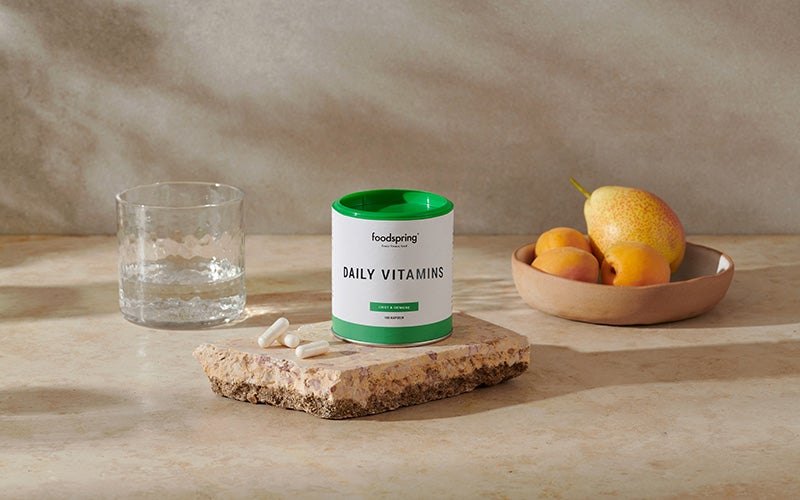6 No-Brainer Ways To Eat More Vitamins Every Day
 ©foodspring
©foodspring
Health fads come and go every few years—just look at the rise and evolution of the ketogenic diet. But as nutrition advice changes and health pros continue to debate fundamental questions like “are eggs healthy?” some food truths stay the same, like the importance of getting enough vitamins and minerals in your diet.
Vitamins are micronutrients that your body needs to get through your diet to stay healthy and properly function. For example, your body uses vitamin C to help absorb iron and repair your skin tissues, and vitamin B12 to make red blood cells and support the immune system. Some vitamins, such as vitamin D, can be produced by your body as well but not in enough quantities to support all of your important metabolic functions. To make sure your needs are covered even in today’s stressful daily hustle and bustle, try our capsules of easy-to-take Daily Vitamins.
However, getting enough vitamins in your diet can be challenging, especially if you’re on a special diet or have food allergies or intolerances. Plus, while eating whole foods is generally considered the gold standard for getting good nutrition, budget and time constraints can make that standard way out of reach. Here, we break down the daily vitamin intake for adults for optimal health, and share some smart tips on how to meet those needs.
Related: What to eat after a workout
What is the recommended daily vitamin intake for adults?
There are 13 essential vitamins that your body needs to properly function. How much you need of each depends on various factors such as age, gender, health, metabolism, digestion, and activity level. If you’re pregnant or breastfeeding, for example, you need more of specific vitamins (like folic acid) to support your body as it grows and feeds your baby.
Some vitamins — A, D, E, and K — are fat-soluble, meaning that they dissolve in fats and oils. They’re stored in your liver and fat tissue, and can make you sick if you eat too much of them. Water-soluble vitamins, on the other hand, are not stored in the body and all excesses are released in your urine.
Here’s an overview of the essential vitamins you need to consume every day. Note that the recommended daily amounts (RDAs) for women are a range, since needs change if pregnant or breastfeeding.
- Vitamin A: Supports vision and immune and reproductive function. Men need 900 mcg per day, and women need 700 to 1300 mcg per day.
- Vitamin C: The antioxidant is crucial for immune support and making collagen to heal wounds. Men need 90 mg per day, and women need 75-120 mg per day.
- Vitamin D: Helps your body absorb calcium and strengthen bones, as well as support nerve function and immune health. Adults need 15-20 mcg per day.
- Vitamin E: Another antioxidant that protects cells from damage from free radicals and boosts the immune system and prevents blood clots. Adults need 15 mg per day.
- Vitamin K: Helps your blood clot properly and keeps bones healthy. Men need 120 mcg, and women need 75-90 mcg per day.
- Thiamin: Also known as B1, it helps convert food into energy. Men need 1.2 mg per day, women need 1.1-1.4 mg per day.
- Riboflavin: Also known as vitamin B2 and helps cells grow and convert food to energy. Men need 1.3 mg per day, and women need 1.1-1.4 mg per day.
- Niacin: Also known as vitamin B3, it helps turn food into energy and supports cell development and function. Men need 16 mg per day and women need 14-18 mg per day.
- Vitamin B6: Supports metabolism and helps develop the brain during pregnancy. Adults need 1.3-2 mg per day.
- Vitamin B12: Helps make DNA and keeps blood and nerve cells healthy. Can only be naturally found in animal foods. Adults need 2.4-2.8 mcg per day.
- Pantothenic acid: Aka vitamin B5, helps turn food into energy and makes and breaks down fat. Adults need 5-7 mg per day.
- Biotin: Helps convert carbs, fat, and protein into energy. Adults need 30-35 mcg per day.
- Folate: Used to make DNA, and is essential for fetal development. Adults need 400-600 mcg per day.
All that said, vitamin requirements always vary depending on the individual. It’s not a bad idea to have a micronutrient check-up with your doctor if you’re concerned about vitamin deficiencies, especially if you’re pregnant, breastfeeding, or on a specialized diet that restricts certain food groups. If a nutrient deficiency or a problem with absorption should come up, your doctor likely will recommend you take specific supplements or change your diet.
How to increase your vitamin intake
You primarily get vitamins from the foods you eat. Different foods provide different types of vitamins and in different amounts. Vitamin A, for example, can be found in dark leafy vegetables, beef, fish, and egg yolks, while you can find folate in lentils, peanut butter, beets, and asparagus.
That said, meeting your vitamin needs in everyday life can feel challenging. Who knows all the nutrition info tables and vitamin requirements by heart? These simple tips will help you get your vitamin needs without a ton of work (or thought).
1. Eat fruits and vegetables daily
Fruits and vegetables are naturally rich in vitamins and minerals. According to the U.S. Dietary Guidelines, adults should eat two cups of fruit and two-and-a-half cups of vegetables per day in order to meet their nutrition needs. This might not seem like a lot, but considering only 10 percent of Americans are eating enough fruit or vegetables, it’s definitely a good place to start. Eat a smoothie with greens as a breakfast or snack, add extra vegetables to your sandwich at lunch, and have an apple with nut butter for your afternoon snack, and you’re already there.
2. Eat a variety of foods
It’s not just fruit and vegetables that have vitamins and minerals. Many foods, including grains, meat, and dairy, have nutritional perks beyond their core macronutrients. And all foods have slightly different micronutrient profiles. Citrus fruits are packed with vitamin C, while sweet potatoes and carrots offer vitamin A.
Cover your bases with a varied diet. Challenge yourself to try a few different vegetables every week (say a leafy green and a root vegetable or two), and rotate your main protein source to mix things up flavor and nutrition-wise.
Even though they look mostly green from the outside, the fruits and vegetables in our Daily Vitamins have a whole spectrum of colors—and thus offer a wide variety of nutrients—from broccoli, tomatoes, carrots, brussel sprouts, onion, apple, grapes, wild blueberries, raspberries, cranberries, plums, blueberries, strawberries, and spirulina.
3. Eat seasonally…
Eating regionally and seasonally has clear benefits for your vitamin needs. By changing your diet with the seasons, you automatically vary your nutrients throughout the year. In addition, foods grown locally require less transportation and can ripen in peace before harvest, so they’re fresher and may have a higher vitamin content.
4. Or shop the freezer section
That said, if farmer’s markets, farm stands, and CSAs are not accessible or affordable to you, there’s another way to eat nutrient-dense produce. And it starts in the freezer case. Research shows that the vitamin content of frozen fruits and vegetables is nearly identical to their fresh counterparts. Frozen produce is often less expensive than fresh produce, too, and lasts a lot longer.
5. Focus on whole foods where possible
Whole grains and fruits and vegetables with the skins help meet your vitamin needs because they have significantly more vitamins than the refined versions. Most of the vitamins and nutrients in plant foods are located between the outer layer and the fruit/nut/seed, which are typically removed in ultra-processed foods.
That said, fortified foods can be helpful (and healthy!) ways to get vitamins that are otherwise tough to come by in your diet. Vitamin D, for example, isn’t easily found in foods other than fish, so fortified milk can help you meet your nutritional needs. Vegans will also need to look for foods with vitamin B12 added in, as it’s not naturally found in plant foods.
Refuel: Try our vegan whey protein either before or after exercising
6. Supplement your diet in a smart way
Eating vegan and know you might be lacking some essential nutrients? Planning on getting pregnant? Or know you can’t manage to eat enough fruits and vegetables because of a busy schedule? Then supplement in a smart and targeted way to fill in nutritional gaps.
With our Daily Vitamins you cover 100% of your daily requirements of the important vitamins A, D, E, C, K, and the B vitamins 1, 2, 3, 6, 7, 9, and 12.
More healthy living tips from foodspring:
- Weight Loss Workout Plan: What you need to know
- How to Lose Weight with Yoga
- How to lose weight without dieting: 13 tips to your feel-good body
- Create your ideal weight loss meal plan and work towards your feel-good body!
- Weight Lifting For Weight Loss
Sources for this article
We at foodspring use only high-quality sources, including peer-reviewed studies, to support the facts within our articles. Read our editorial policy to learn more about how we fact-check and keep our content accurate, reliable, and trustworthy.

































